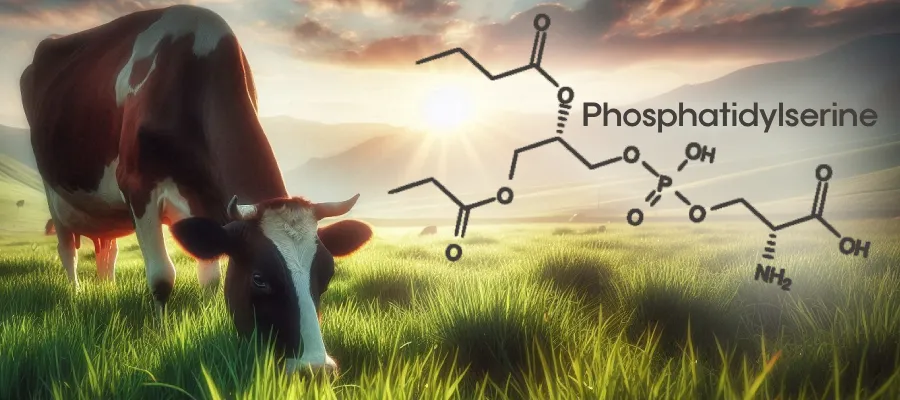The Right to Choose Good Phosphatidylserine
What is Phosphatidylserine?
Phosphatidylserine (PS) is a phospholipid with well-documented benefits for cognitive function, memory, and overall brain health. It plays a crucial role in maintaining neuronal cell membrane integrity, facilitating neurotransmitter activity, and supporting brain plasticity. Research indicates that PS supplementation can enhance memory recall, improve attention, and slow cognitive decline, particularly in aging populations. In fact, studies have also suggested that PS may reduce stress-related cortisol levels, promoting better mood regulation and resilience to mental fatigue. Additionally, PS has been linked to improved exercise performance by mitigating stress responses and enhancing recovery. Given its broad neurological and physiological benefits, PS is considered a vital nutrient for cognitive longevity and mental clarity.
Sounds pretty good, right? But there’s a problem. Historically sourced from bovine brain tissue, PS was later replaced by plant-based alternatives such as soy and sunflower lecithin. Don’t get me wrong, I’m happy that alternatives exist, but the question is, Why? Well, we are told it’s due to health concerns. Is that accurate?
Why Source Matters: Bovine, Soy, and Sunflower PS
In my opinion, the source of phosphatidylserine is more than a trivial concern—it affects efficacy, bioavailability, and potential risks. Currently, there are three potential sources:
- Bovine-Derived PS: Historically, it has been the gold standard due to its fatty acid composition, which closely mirrors human neuronal membranes. However, concerns over bovine spongiform encephalopathy (BSE or “mad cow disease”) led to its removal from consumer markets. The problem here is that there have been no recorded cases of PS transmitting prions.
- Soy-Derived PS: Soy is the most common alternative. However, it carries risks as well, such as phytoestrogens (which may affect hormone levels), allergenicity, and the use of chemical solvents in processing. To me, this is not a solid alternative.
- Sunflower-Derived PS: This option is derived from sunflower lecithin. It is a cleaner option that avoids both soy allergens and prion concerns. The downside here is that it is still plant-based, which comes with various concerns, but it also comes at a little bit of a higher cost.
The Barriers to Accessing Bovine PS
Despite no proven cases of PS transmitting prions, regulatory bodies have imposed sweeping restrictions on bovine-sourced PS, essentially eliminating consumer choice. However, I want to emphasize that this decision was based on a theoretical risk, not empirical evidence. Now, many might not care because of the alternatives available, but this situation demonstrates a broader issue: risk aversion overriding scientific accuracy, and this is seen in many areas of health.
If accuracy matters, and if health risks are truly a concern, then we have to recognize that soy-derived PS remains widely available despite concerns about its phytoestrogen content, allergenicity, and environmental damage caused by monocropping. Why is one so bad and the other an acceptable alternative when, objectively speaking, the alternative seems to be significantly worse than the original?
The selective nature of these regulations raises many questions. For example, is this truly about safety, or is it an example of regulatory overreach limiting access to effective animal-based nutrients? After all, if you consider the trend, there seems to be a massive push to keep you from animal products in general—despite the fact that many key nutrients come only from animal sources.
The Increased Demand Fallacy
Of course, there is always going to be an emotionally contorted debate when it comes to things like this. One of the more frivolous concerns in the debate over phosphatidylserine is the claim that shifting from soy-derived PS to bovine-derived PS will significantly increase demand for cattle products, thereby exacerbating environmental and ethical concerns associated with the livestock industry. However, this argument is flawed for several reasons.
First, bovine PS is derived from brain tissue, which is a byproduct of the meat industry. In other words, it makes use of materials that would otherwise be discarded. I would argue that it’s actually more of an ethical move because less of the animal goes to waste. It reminds me of something conservationist Aldo Leopold said, “Ethical behavior is doing the right thing when no one else is watching—even when doing the wrong thing is legal.”
Second, the demand for PS is relatively niche, especially compared to the massive global beef and dairy industries. In fact, I would argue that it’s relatively niche in the supplement market as well. Objectively speaking, it’s really nothing more than a boutique product for informed users. What this means is that its creation does not drive increased cattle farming at all. On that note, I would imagine that many of the people reading this have never even heard of it before now. The point is that any supposed impact on demand would be either negligible or nonexistent.
Finally, critics often ignore the fact that bovine-derived PS has repeatedly demonstrated superior bioavailability and efficacy in cognitive health, particularly in aging populations, making it a more effective choice. If the goal is to prioritize human health and scientific merit, dismissing bovine PS based on speculative demand and overstated health risks is intellectually dishonest. Of course, like anything else, the effort is likely meant to detract us from what they wish to hide. Regardless, the supposed logic of the restriction isn’t very logical. So, let’s talk about that for a moment.
The Double Standard in Health Regulations
Indeed, health regulations often prioritize theoretical risks over real-world benefits. That is common, and I do understand the attempt. However, I think it’s a little too much in this situation.
- No Reported Cases: Unlike contaminated meat products or even alarmingly high incidents of food poisoning from vegetables, no contaminated batches of bovine PS have ever been identified. Yet, for some reason, it remains highly restricted while the other threats are realized daily without mention.
- Sourcing Hypocrisy: Bovine phosphatidylserine is supposedly restricted because of the fear of transmitting disease. However, you can easily source “Grass Fed Beef Brain Supplements” (or any other bovine organs) online (Amazon Link) or at your local health food store with no issues whatsoever. If bovine supplements were such a threat, wouldn’t these other products also be restricted or banned?
- Environmental Hypocrisy: While cattle farming is criticized for its carbon footprint, and this argument is often used as a reason for the effort, I would argue that soy monocropping has led to a significantly worse environmental situation. If you think this is a stretch, then I highly encourage you to look into soy’s association with massive deforestation, biodiversity loss, and heavy pesticide use. So why restrict one and not the other, especially when the other is significantly worse? This is a deep rabbit hole, by the way. When you look into soy, you may not like what you find.
- Nutrient Bioavailability: Humans are omnivores. Omnivores require certain nutrients. Many of these essential nutrients (B12, heme iron, DHA) are found predominantly in animal products. Yet, there is a push to eliminate them in favor of plant-based alternatives. Why? The problem here is that many plant-based alternatives are not as bioavailable and can contribute to low-grade inflammation (which is linked to all sorts of diseases, including cancer). Take that and match it with the endless articles talking about why certain supplements are a waste of money and how you should just go talk to your doctor about the latest pharmaceutical. Weird.
Why the Preferred Source Matters
Here’s the deal: bovine PS offers clear advantages over plant-derived versions due to its specific fatty acid composition, which is thought to enhance neurological benefits. Is that a clue? Yet, consumers are denied access based on fear-driven policies rather than scientific evidence. Meanwhile, plant-based sources, despite their own significant list of risks, are marketed as superior alternatives without sufficient scrutiny. If I were to put on my conspiracy hat, it makes perfect sense. Without that hat, this really doesn’t make much sense to me—logically or scientifically. My question is, why fixate on bovine PS’s phantom menace, and why the push to get everyone else to focus on that as well?
Let’s get back to the point. Understand that the real issue isn’t just about phosphatidylserine. I’m just using this as an example. The issue is about informed choice in health decisions. Consumers should have the right to select the best sources for their health needs rather than being subjected to one-size-fits-all regulations imposed by those who likely do not fully understand the science, let alone the repercussions of their biased decisions. I’m tired of discovering a solution to a problem only to find that the solution has been blocked for frivolous or nonsensical reasons.
We Need Informed Consent Over Paternalism
Rather than eliminating bovine phosphatidylserine as an option, regulators should focus on transparency. In my opinion, consumers deserve the option. If regulators have a concern, that’s fine, but policies should be based on real-world evidence, not hypothetical dangers. If you want me to believe that the effort is for my safety, you’re going to have to come up with some balanced reasoning.
Let’s put this into perspective. The number of illnesses caused by vegetables is in the thousands annually. In fact, leafy vegetables alone were associated with 606 outbreaks from 1973 to 2012, resulting in 20,003 illnesses, 1,030 hospitalizations, and 19 deaths (likely much more). Meanwhile, I can’t get any bovine-sourced phosphatidylserine, despite the fact that it has been around since at least the late 20th century, the FDA gave it a “qualified health claim” status in 2003, and there are effectively zero reported cases of any illnesses related to bovine-sourced phosphatidylserine… and I can purchase bovine organs anytime I want. The math isn’t mathing.
Now, some might argue that the absence of cases is the result of the restrictions, which is a good argument. However, that logic falls apart entirely when you consider that bovine-sourced phosphatidylserine was widely available before restrictions were imposed, yet no surge of illnesses was ever documented. If the risk were truly significant, there would have been clear historical evidence of harm before regulatory measures were put in place. Furthermore, if we apply the same precautionary principle uniformly, then high-risk foods like leafy greens should face similar scrutiny. Instead, we see an inconsistent regulatory approach where demonstrably risky foods remain readily available while a substance with no meaningful history of harm is effectively prohibited.
If they are truly concerned about the source material, that’s fine. But don’t just take it away. Just enforce labels that discuss how supplements are derived. Of course, if you’re going to do that to animal-sourced products, they might also have to include a warning about the use of enzymes and solvents in the processing of all forms. We can’t have that, can we? That might encourage people to avoid certain plant-based supplements and, perhaps, question some of their related behaviors, wouldn’t it? Weird.
Anyway, this is America—where all laws that are repugnant to the Constitution are void. Yet, here we are. However, I do understand the importance of public health safety. Some might argue that a balance must be struck. I can live with that, but the balance is easy: allow access to bovine PS with appropriate safety measures and labeling rather than outright restrictions or bans.
Final Thoughts
Health decisions should always be based on rigorous science—not outdated fears or ideological preferences. In my opinion, the case of phosphatidylserine demonstrates a broader issue in modern health regulation: the suppression of effective animal-derived nutrients in favor of plant-based alternatives that come with their own risks. Consumers deserve the right to make informed choices—period! The point is that these choices should absolutely be free from unnecessary restrictions imposed by those who often lack an understanding of the full scientific picture.
On a bit of a side note, if you really want to point the finger at something related to foodborne illnesses, then animal products are really not the biggest concern. Animal product-related illness only accounts for roughly 22% of all cases. Meanwhile, vegetable-related illnesses account for a staggering 46% of illnesses. Compare that with fruits and nuts, which account for 9%, dairy at around 6%, and fish at about 6%. Do we want to be right, or do we want to be accurate? As philosopher Isaiah Berlin warned, “To force people into the neat uniforms demanded by dogmatic liberals or conservatives is a denial of their humanity.” We live in the age of information. Let’s replace precautionary paternalism with radical transparency and trust humans to navigate trade-offs.
If you would like to learn more, be sure to check out The Persistence of Outdated Medical Knowledge
Dr. Robertson is a health researcher and educator, not a physician. The information provided here is not medical advice, a professional diagnosis, opinion, treatment, or service to you or any other individual. The information provided is for educational and anecdotal purposes only and is not a substitute for medical or professional care. You should not use the information in place of a visit, call consultation, or the advice of your physician or other healthcare providers. Dr. Robertson is not liable or responsible for any advice, course of treatment, diagnosis, or additional information, services, or product you obtain or utilize. IF YOU BELIEVE YOU HAVE A MEDICAL EMERGENCY, YOU SHOULD IMMEDIATELY CALL 911 OR YOUR PHYSICIAN.




